Despite criticism for not having spent enough on new projects, the railway minister has been quick to initiate reforms in some of the Railway's biggest problem areas, says Sudheer Pal Singh.
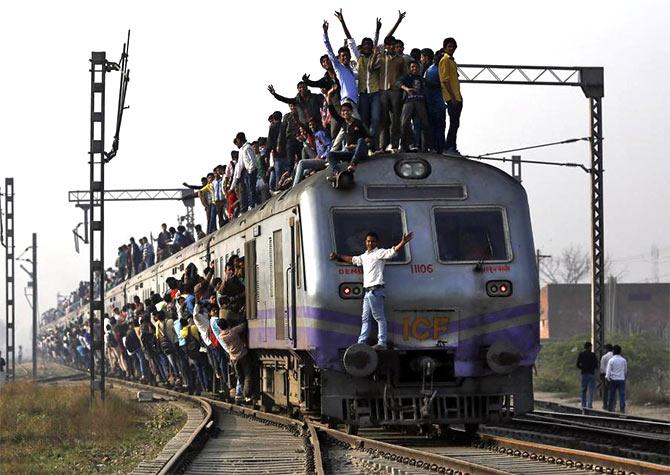
On February 26 this year, at the beginning of his maiden Rail Budget speech in Parliament, Suresh Prabhakar Prabhu philosophically remarked: "I asked myself, 'Hey Prabhu! How will all this happen?'"
He was referring to the daunting task that lay before him of reforming the Indian Railways that had come to be viewed as a monolith.
Seven months on, the comment seems to have returned to haunt the railway minister with questions being asked about his performance.
If reports forecasting his shift from the rail ministry are to be believed, he might indeed require the almighty's blessings to retain his portfolio.
The Prime Minister's Office, PMO, in a recent letter, rapped Prabhu for slow progress on key projects and poor spending of the Gross Budgetary Support, GBS, or the Centre's financial assistance.
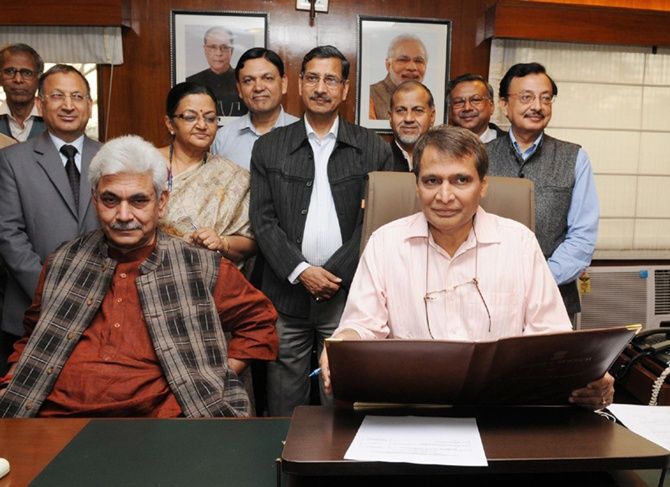
The PMO's letter came within a year of Prabhu assuming charge of the ministry after being hand-picked by Prime Minister Narendra Modi.
The letter was followed by a flurry of media reports criticising the former technocrat on multiple counts. But is Prabhu really the 'fallen god of Indian Railways,' as one report described him?
A Business Standard analysis of data on key parameters of the Railways' performance and the initiatives undertaken reveals that the former chartered accountant-cum-banker might not have fared too badly.
In less than a year in office, Prabhu has been quick to grasp the main reasons why the Railways are in dire straits.
Some of these are: Complete saturation of existing rail lines, many of which are working on more than 100 per cent capacity utilisation, thus choking growth in earnings; inter-mixing of major freight lines with heavy-density passenger routes; cross-subsidisation of passenger fares with freight rates; the constraints of funding sourced as GBS; and popular resentment over passenger amenities.
The ministry has been working to ensure the unclogging of rail line capacities, which was the single biggest theme of Prabhu's Rail Budget.
Network decongestion is done in three ways: Construction of new lines, taking up doubling projects and gauge conversion.
Data shows the Indian Railways' capital expenditure on the three heads rose over 20 per cent to Rs 6,880 crore (Rs 68.80 billion) in the first six months (April to September) of the current financial year compared to Rs 5,733 crore (Rs 57.33 billion) last fiscal.
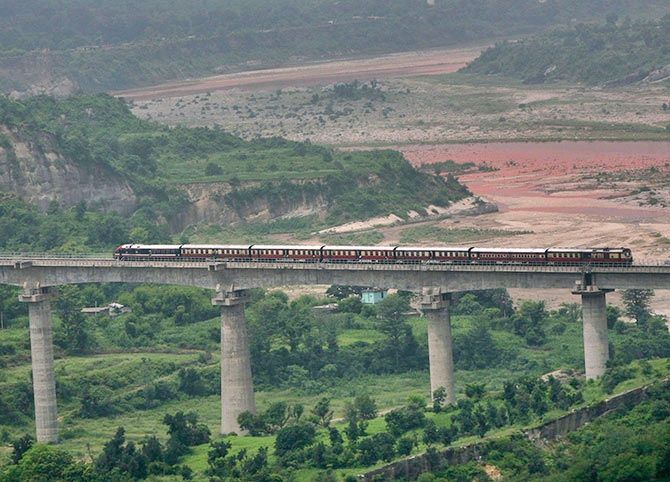
This indicates that the ministry has broadly got its fundamentals right. This expenditure is part of the Rs 1 lakh crore capex planned by the ministry in the current fiscal, which is a historic 53 per cent jump over last year's plan outlay of Rs 65,000 crore (Rs 650 billion).
In this year's budget, Prabhu had earmarked 77 projects that involved doubling of existing lines, laying new lines and gauge conversion in 24 over-saturated corridors.
The ministry has now ramped up the pace to implement these 77 projects and has chalked out a detailed plan to invest Rs 90,000 crore (Rs 900 billion) to commission them in some of the most saturated corridors.
These include the Delhi-Mumbai, Delhi-Howrah, Delhi-Chennai, Howrah-Chennai and Ahmedabad-Rajkot routes.
"We will, in the current fiscal, commission 2,500-km-long corridors as projects for new lines, gauge conversion and doubling of existing tracks on certain busy stretches," says V K Gupta, member-engineering, Railway Board.
He adds that of the 77 projects, 28 have received approval in principle from Niti Aayog. Tenders for these have been invited and work is expected to commence in a few months.
.jpg?w=670&h=900)
A wider network
The ministry has also taken steps to tackle the issue of de-coupling freight traffic from passenger lines.
For the first time in several years, the dedicated freight corridor project, a major initiative in this direction, is showing signs of becoming a reality.
The Dedicated Freight Corridor Corporation, DFCC, the special purpose vehicle commissioning the ambitious Rs 82,000 crore project, has finalised contracts worth Rs 17,500 crore (Rs 175 billion) since November last year.
This is in stark contrast to the contracts worth Rs 12,500 crore (Rs 125 billion) awarded in the preceding nine years.
According to DFCC Managing Director Adesh Sharma, contracts worth an additional Rs 17,000 crore (Rs 170 billion) would be awarded by March 2016, leading to India rolling out the first freight-only rail line by the end of 2018.
DFCC is building over 3,000 km of double track, freight-specific lines from Ludhiana (Punjab) to Dankuni (West Bengal) as Eastern DFC and from Dadri (Uttar Pradesh) to Jawaharlal Nehru Port Trust (Mumbai) as Western DFC.
The project is aimed at decongesting the railways network by separating freight traffic from passenger lines.
"More than 85 per cent of land for the project has been acquired and funding has been tied up," Sharma says. He adds that DFCC would commission its first pilot project on a 56-km stretch between Durgawati and Sasaram in Bihar by March next year.
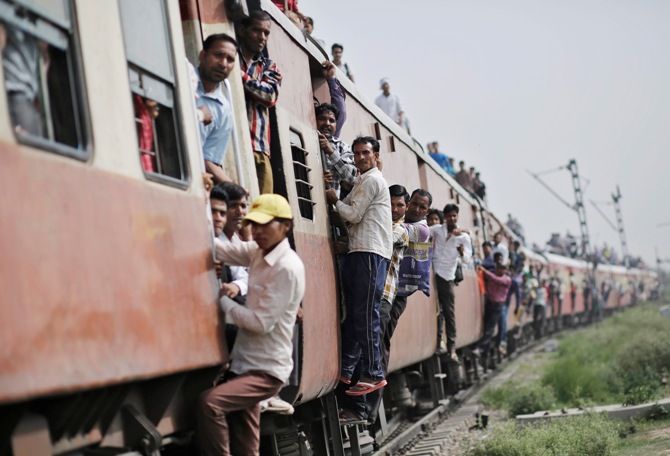
The crucial issue of sourcing institutional funding for projects is also being dealt with. Shortly after the rail budget, the ministry had announced tying up Rs 1.5 lakh crore (Rs 15 trillion) from Life Insurance Corporation over five years.
The first tranche of the funding, around Rs 2,500 crore (Rs 25 billion), is likely to be received soon.
Responding to allegations of lack of spending and questions on his performance, Prabhu recently said his ministry would "far exceed" its capital expenditure target of Rs 8.5 lakh crore (Rs 85 trillion) set for the next five years, through 2019.
And, that it would also exceed the current fiscal's budgeted target of over Rs 1 lakh crore (Rs 10 trillion). "The budget did not talk about the DFC project, the funding for which, around Rs 82,000 crore (Rs 820 billion), was recently approved by the Union Cabinet," Prabhu said last week. "We have already issued contracts worth Rs 15,000 crore in the six months of the current fiscal. The rest will also come soon."
He added that additional spending would materialise from two other initiatives of the ministry, which included "using the money from customers like Coal India and Steel Authority of India for rail evacuation projects and port connectivity projects."
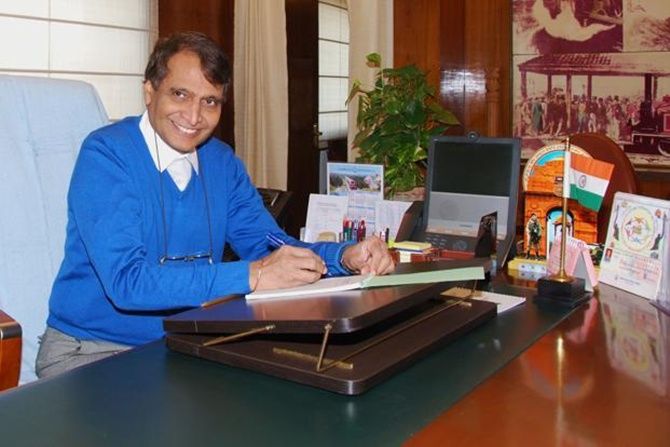
Despite all the work, Prabhu's first year in office will be remembered for the spate of train accidents, particularly derailments, that have claimed many lives and his ministry's inability to speed up the promised high-speed service between Delhi and Agra.
Prabhu had to chair an emergency meeting of general managers last month to identify and deal with issues of passenger safety.
The effort to roll out a high-speed line was also stymied after the commissioner of railway safety denied clearance to the Delhi-Agra service.
According to R Sivadasan, former financial commissioner at Indian Railways, Prabhu has done well, but needs to fine-tune his priorities. "He is the best railway minister so far and must not lose the portfolio," Sivadasan says. "But he must understand that more money needs to be spent on track renewal to bring down derailments and to improve the carrying capacity of the network. Decongestion will happen automatically. It appears he is not being briefed properly by the current board."
Sivadasan, known for turning finances around during the tenure of Lalu Prasad Yadav as rail minister, rejects the allegations of lack of spending and says the bulk of the spending typically happens in the second half of the fiscal when project activity picks up.
KEY ACHIEVEMENTS
- Capex on decongestion projects increased 20 per cent to Rs 6,880 crore in April-September 2015
- Rs 1.5 lakh crore in funding secured from LIC over five years
- Tenders to be invited for 28 projects over the next few months
- 77 projects worth Rs 90,000 crore to be commissioned on 24 saturated corridors this fiscal









